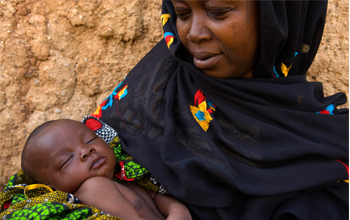Research Brief
Is unpaid care work addressed well in World Bank projects?
- Only three out of 36 World Bank investments in Malawi, Mali, Niger and Rwanda appropriately address women’s unpaid care work.
- Despite the lack of World Bank investments specifically targeting unpaid care work, Bank investments do appear to be increasingly integrating gender dimensions into project design.
- Malawi’s Shire River Basin Management Programme and Niger’s Community Action Programme provide examples of World Bank investments that effectively target unpaid care work.
The vast majority of care work—tasks such as caring for family members, collecting fuel and water, cooking meals, harvesting food and maintaining shelter—is performed by women. While this work is a labour-intensive essential component of daily life that also contributes to the health of a national economy, it is unremunerated, unquantified, and unacknowledged in most cases. In sub-Saharan Africa women dedicate a substantial portion of their time to care work, and this work is increased through insufficient government spending on social services, climate-related resource scarcity, and high rates of HIV/AIDS.
The World Bank underlined the importance of women’s formal participation in labour markets in its 2009 gender strategy, and has acknowledged the link between care work and women’s limited employment. While the Bank is thus ostensibly committed to address this issue, to what extent are its projects actually addressing women’s unpaid care work in sub-Saharan Africa?

An overview of care and gender in World Bank investments in four countries
Malawi, Mali, Niger, and Rwanda represent four low-income sub-Saharan African countries where the World Bank has invested funds; Malawi and Rwanda are considered ‘above average’ for gender equality in the region, while Mali and Niger are considered ‘below average’. In each of these countries, World Bank investments can be examined for gender sensitivity and specific focus on care work in four different sectors: agriculture, education, infrastructure, and private sector development.
Out of a total of 36 projects in these four sectors, only three explicitly focus on reducing women’s lack of time—time poverty—due to care-related responsibilities, while the design of the remaining 33 projects fails to account for unpaid care work. This is a clear indicator that women’s unpaid but necessary contributions are undervalued in project design, further hindering their employment and human development opportunities.
However there are some aspects of Bank investments that clearly do effectively integrate a gender dimension. Out of the 36 projects surveyed, 11 moderately to strongly take gender into account in their design. Out of these 11World Bank development projects, eight have been approved and implemented since 2010; this demonstrates the Bank’s increasing integration of gender dimensions into the design of projects, such as the recognition of women as stakeholders and project participants. Furthermore, the collection of sex-disaggregated data has also improved, providing a clearer picture of the contribution of both men and women to unpaid care work.

Recommendations for future investments
- The Bank must expand its overall commitment to respect women’s rights and to value and compensate care work.
- Female beneficiaries should be participants in the design and implementation of all World Bank projects.
- The Bank should work on improving sex-disaggregated data and additional time-use surveys, which can also improve the knowledge base with which future programmes can be designed in a more gender-sensitive manner.
The agriculture, education, and infrastructure sectors can also benefit from further assessments and gender analysis to guarantee that future investments concentrate on equalizing burden and benefit for both women and men. Community meetings should be organized regularly and women must be more involved in the programme design, implementation and evaluation processes to ensure that projects are gender sensitive and appropriately advancing the rights and roles of women, rather than perpetuating traditional gender roles.
From a policy perspective, cuts to essential social services must be suspended, as these reductions increase the amount of care work for women. Gender-budgeting should take into account household time use, and banking and finance systems should consider the obstacles faced by those engaged in unpaid care work. Women leaders must also be promoted at all levels and quality care programmes must be supported to expand paid employment.
- The World Bank should give unpaid care attention that reflects the true contribution of the labour involved.
- The World Bank should avoid cuts to essential social services, as these reductions increase the amount of care work women undertake.
- A major shift needs to occur in the tradition of care, from being the domain of women to being a task shared by all.
Finally, the visibility, value and remuneration of unpaid care work must receive more attention to capture the true contribution of this important work. A major shift in the tradition of care from the feminine to the broader human domain must occur.
 Join the network
Join the network